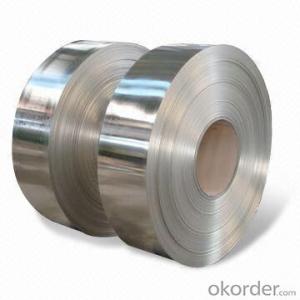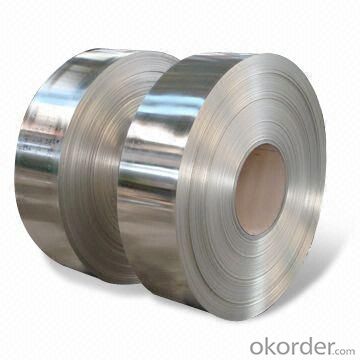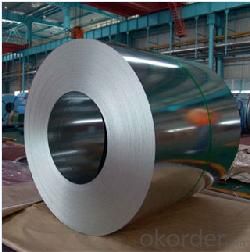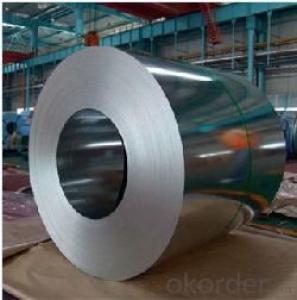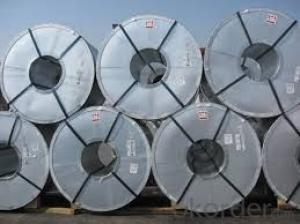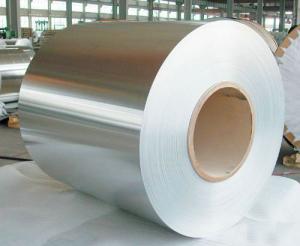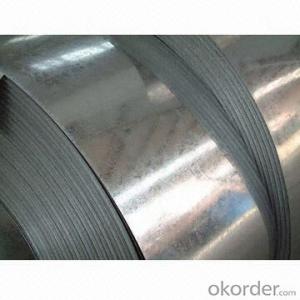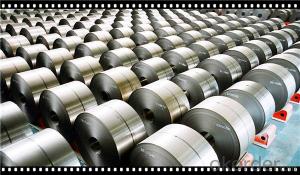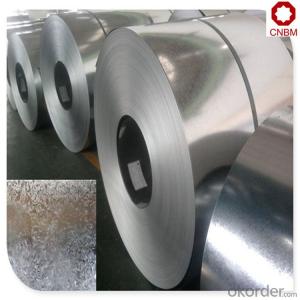Hot dipped galvanized steel coils z275 z400
- Loading Port:
- Shanghai
- Payment Terms:
- TT OR LC
- Min Order Qty:
- 25 m.t.
- Supply Capability:
- 10000 m.t./month
OKorder Service Pledge
OKorder Financial Service
You Might Also Like
Quick Details
| Standard: | ASTM, GB, JIS | Grade: | SGCC. SGCH. DX51D+Z. JIS G3302 | Thickness: | 0.15mm-5.0mm |
| Place of Origin: | China (Mainland) | Brand Name: | CNBM | Type: | Steel Coil |
| Technique: | Cold Rolled | Surface Treatment: | Galvanized | Application: | Roofing sheet and PPGI Base and Building Materials |
| Special Use: | High-strength Steel Plate | Width: | 600mm-1250mm | Length: | Customized |
Packaging & Delivery
| Packaging Details: | Export Packing |
| Delivery Detail: | 30 Days |
Galvanized Steel Coil
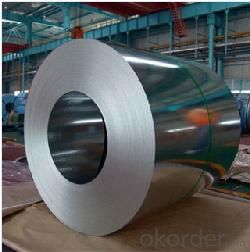
Specifications:
Thickness: 0.13mm TCT up to 5.0mm TCT.
Width: 600mm up to 1250mm.
Zinc Coating: 40-450G/M2.
Chromated, Dry, Skin-passed, Tension Level, Shining. Oiled or Unoiled.
Regular Spangle, minimum Spangle, Large Spangle, Zero Spangle.
Temper: Full Hard (85-95 HRB; G550). Commercial Quality (50-75 HRB; G350).
Coil Weight: 3-6 MT.
Coil ID: 508mm or 610mm.
Shipment: By Bulk or By 20GP Container.
Waterproof Standard Export Packing.
Payment Terms: by T/T or L/C at Sight.
Delivery: 30 Days.
FAQ
We have organized several common questions for our clients,may help you sincerely:
1)How to guarantee the quality of the products?
We have established the international advanced quality management system,every link from raw material to final product we have strict quality test;We resolutely put an end to unqualified products flowing into the market. At the same time, we will provide necessary follow-up service assurance.
2)How long can we receive the product after purchase?
In the purchase of product within 20-25 days, we will arrange the factory delivery as soon as possible. The pacific time of receiving is related to the state and position of customers. Commonly 15 to 30 days can be served.
3)Syringes are CE,FDA approved. And we supplied main nations in the world.
- Q: Is condensation on steel caused from water being pulled out or is the condensation formed from the air around the steel object?
- steel is made from very high temperature iron. water would vapourize at such high temperature. adding a little bit carbon, mix it well with iron, quench (dip it into water); water around the ingot would sizzle. water inside the ingot would vapourize. then the iron turns into steel called martensite. condensation means water are materializing from the air on cold surfaces. there is no water molecules inside steel.
- Q: What are the dimensions of a steel coil?
- The dimensions of a steel coil can vary depending on its intended use and manufacturer. However, typical dimensions include a width ranging from 600mm to 2,200mm, a diameter of 600mm to 2,000mm, and a weight ranging from a few hundred kilograms to several metric tons.
- Q: How are steel coils inspected for oil or rust residues using chemical analysis?
- Chemical analysis techniques can be employed to inspect steel coils for the presence of oil or rust residues. One widely used method is Fourier transform infrared spectroscopy (FTIR), which involves subjecting a small sample of the steel coil to infrared radiation and analyzing the resulting infrared spectrum. By identifying specific chemical bonds indicative of oil or rust residues, this technique can effectively detect their presence. For oil residue detection, a common approach is to examine the FTIR spectrum for a peak at approximately 2920 cm-1, which corresponds to the stretching vibration of C-H bonds in hydrocarbon chains. The observation of this peak signifies the existence of oil residues on the steel coil. To identify rust residues, the FTIR spectrum is scrutinized for characteristic peaks associated with iron oxide or hydroxide compounds. For instance, the presence of a peak at around 560 cm-1 suggests the presence of iron oxide (FeO) or iron hydroxide (Fe(OH)3). Apart from FTIR analysis, other chemical analysis techniques like X-ray fluorescence spectroscopy (XRF) or energy-dispersive X-ray spectroscopy (EDX) can also be employed. These methods provide information about the elemental composition of the steel coil, enabling the identification of specific elements linked to oil or rust residues, such as carbon or iron. In essence, the chemical analysis of steel coils for oil or rust residues offers a dependable and precise means of ensuring the coils' quality and cleanliness before further processing or utilization.
- Q: Is 440 steel relatively strong or weak?
- medium-strong....you probably mean Steel 44... right?
- Q: I don't know it is low alloy steel or high allow steel or medium carbon steel
- Pretty sure it's low alloy steel, it's harder to smelt as it can contain up to 50% of other elements.
- Q: Already on my team is Empoleon lvl 82Heatran lvl 74Scizor lvl 34Magnezone lvl 38What other steel types should I choose?
- Skarmory, Steelix, Metagross, or Bastiodon. Personally I would switch Heatran, as I don't feel right using Legendaries.
- Q: so i just bought a stainless steel bracelet.......and recently found out that stainless steel isnt actually stainless..........will turpentine ruin it
- real s/steel is nickel and chrome, however manufacturers of kitchenware, e.g s/teel cutlery use the cheaper version of nickel chrome and iron, that is why some s/steel products rust, so if you want to test any products carry asmall magnet and test the article
- Q: How are steel coils inspected?
- Steel coils are inspected using various methods such as visual inspection, ultrasonic testing, magnetic particle inspection, and eddy current testing. These techniques help identify any defects, irregularities, or damages in the steel coils, ensuring their quality and suitability for further processing or use.
- Q: I already have the county permits and bank loan, but the foundation hasn't been poured. Is it too late to convert to steel?
- Steel is going to be a whole different world. You will need to go back to square one and get house plans that are drawn for structural steel. First thing you need to do is find a builder that knows how to build with steel and get an idea of the price.
- Q: What is the process of recoiling steel coils?
- The process of recoiling steel coils involves rewinding or unrolling large steel coils to create smaller, more manageable coils. This process is typically carried out in steel processing plants or coil service centers. The first step in the recoiling process is to identify the appropriate coil to be recoiled. This selection is based on factors such as coil size, weight, and quality. Once the coil is chosen, it is placed onto a recoiling machine, which is equipped with various mechanisms to facilitate the recoiling process. The recoiling machine consists of a mandrel or drum, around which the coil is wound or unwound. The coil is secured onto the mandrel, either by mechanical clamps or hydraulic pressure, to ensure it remains stable during the recoiling process. In the case of rewinding or recoiling a large coil into smaller coils, the machine starts by unwinding the original coil. This is done by rotating the mandrel in the opposite direction, causing the coil to gradually unroll. As the coil unwinds, it passes through various straightening and flattening mechanisms, which help to ensure the coils are produced with consistent dimensions and quality. Once the original coil is completely unwound, the machine starts the rewinding process. The smaller coils are created by winding the steel strip onto the mandrel in a controlled manner. The speed and tension of the rewinding process are carefully regulated to prevent any damage to the steel strip. During the recoiling process, various quality control measures are implemented to ensure the produced coils meet the desired specifications. These may include monitoring the thickness, width, and surface quality of the steel strip, as well as conducting periodic inspections to detect any defects or irregularities. Once the rewinding process is completed, the smaller coils are typically removed from the mandrel and prepared for further processing or shipment. This may involve applying protective coatings, labeling, or packaging the coils, depending on their intended use. In summary, the process of recoiling steel coils involves unwinding large coils, straightening and flattening the steel strip, and rewinding it onto a mandrel to create smaller, more manageable coils. This process requires specialized machinery and careful control to ensure the quality and consistency of the recoiled coils.
Send your message to us
Hot dipped galvanized steel coils z275 z400
- Loading Port:
- Shanghai
- Payment Terms:
- TT OR LC
- Min Order Qty:
- 25 m.t.
- Supply Capability:
- 10000 m.t./month
OKorder Service Pledge
OKorder Financial Service
Similar products
Hot products
Hot Searches
Related keywords
